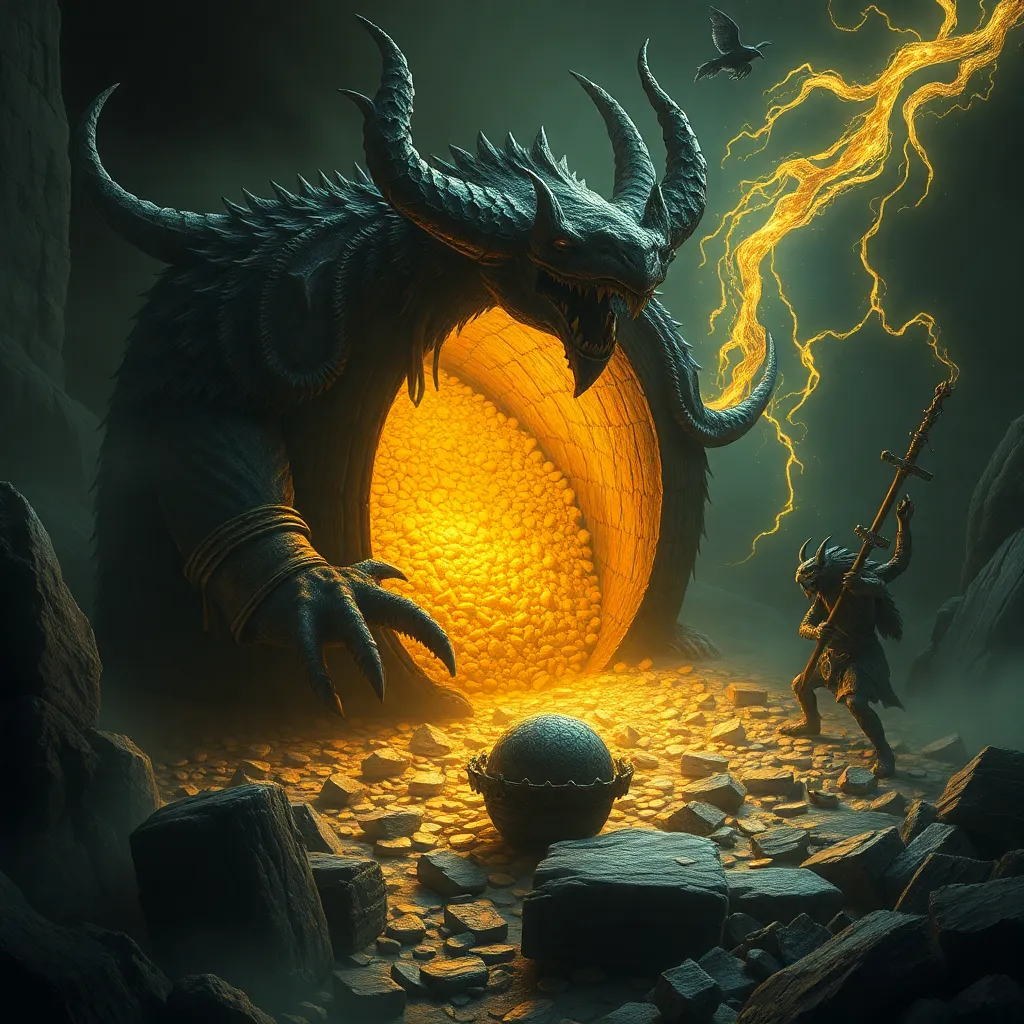The Price of Gold: Fafnir’s Hoard and its Consequences
I. Introduction
Gold has long been a symbol of wealth and power, captivating the hearts and minds of individuals throughout history. Its luster and rarity have made it a coveted resource, often associated with prosperity and success. However, the pursuit of gold can lead to darker paths, as illustrated in various mythologies. One of the most compelling stories is that of Fafnir’s Hoard from Norse mythology, which provides a vivid exploration of greed and its consequences.
This article delves into the intricate tale of Fafnir, examining the origins of his hoard, the symbolism of gold, the curse that accompanies it, and the lessons imparted through the hero’s journey of Sigurd. Ultimately, we will reflect on the modern implications of this ancient narrative, drawing parallels between mythological consequences and contemporary realities.
II. The Origins of Fafnir’s Hoard
The story of Fafnir begins with the tale of a powerful dwarf who, consumed by greed and ambition, transforms into a dragon to guard his ill-gotten treasure. Fafnir, originally a member of the powerful line of dwarves known as the Nibelungs, is drawn into a tragic fate due to the cursed gold he acquires from the Rhine River. This gold, known as Andvaranaut, comes with a deadly curse that brings misfortune to all who possess it.
The mythological context of Fafnir’s Hoard is rich with themes of greed, transformation, and the tragic consequences of desire. The hoard itself represents not only material wealth but also the moral decay that often accompanies the relentless pursuit of riches.
III. Symbolism of Gold in Mythology
Gold serves as a powerful representation of wealth and ambition across various mythologies. In many cultures, it embodies the aspirations of humanity, as well as the inherent dangers that accompany such desires. The duality of gold is evident; it can create opportunities and foster creativity, but it can also lead to destruction and despair.
In Norse mythology, Fafnir’s tale exemplifies this duality. Other mythologies also present similar themes:
- In Greek mythology, the story of King Midas illustrates the folly of greed, where everything he touches turns to gold, ultimately leading to his isolation.
- In the Bible, the love of money is described as the root of all evil, highlighting the moral pitfalls associated with wealth.
- In Hindu mythology, the pursuit of material wealth can distract from spiritual enlightenment, emphasizing a balance between the physical and the spiritual.
IV. The Curse of Fafnir’s Hoard
The curse that accompanies Fafnir’s Hoard has profound implications, particularly regarding the impact of greed on both Fafnir and those around him. As Fafnir transforms into a dragon to protect his treasure, he becomes a symbol of the destructive nature of avarice. His once noble character is overshadowed by his desire to hoard wealth.
Moreover, the consequences of the curse extend beyond Fafnir; those who seek the gold often meet tragic ends. The curse serves as a warning that the pursuit of wealth can lead to ruin, echoing timeless moral lessons about the dangers of greed:
- Greed can corrupt even the most virtuous individuals.
- The relentless pursuit of wealth often leads to isolation and despair.
- Material wealth, when pursued at the expense of ethical values, can have dire consequences.
V. The Quest for Fafnir’s Gold
The heroic journey to acquire Fafnir’s gold is epitomized in the tale of Sigurd (Siegfried), a young hero who seeks to slay the dragon and claim the hoard. Sigurd’s quest is fraught with challenges, including confronting the monstrous Fafnir and navigating the treacherous landscape of greed and ambition.
Throughout his journey, Sigurd undergoes significant transformation. His initial motivations are rooted in glory and wealth, but he ultimately learns valuable lessons about the nature of greed and its consequences. The pursuit of gold becomes a catalyst for personal growth, forcing Sigurd to confront not only Fafnir but also the moral implications of his desires.
VI. The Consequences of Acquiring Wealth
The fallout from claiming Fafnir’s Hoard extends far beyond the individual. While Sigurd successfully slays Fafnir, the acquisition of the treasure does not lead to the fulfilling life he envisioned. Instead, it brings about a series of tragic events that impact his relationships and personal values.
Some of the effects of acquiring such wealth include:
- Strain on friendships and alliances, as greed breeds mistrust.
- Corruption of personal values, leading to moral decay.
- Isolation from others, as the pursuit of wealth often supersedes genuine human connections.
The lessons from Fafnir’s story resonate with historical reflections on wealth acquisition, reminding us that the pursuit of riches can lead to unintended consequences, both personally and socially.
VII. Modern Parallels: The Price of Gold Today
In contemporary society, gold continues to hold significant value as an investment. Its allure remains strong, as many view it as a safe haven during economic uncertainty. However, the ethical considerations surrounding gold mining and trade raise questions about the true cost of this coveted metal.
Some modern parallels to the consequences of Fafnir’s Hoard include:
- Environmental degradation caused by gold mining practices.
- Exploitation of workers in the mining industry, often leading to human rights violations.
- The impact of gold trading on global economies and individual livelihoods.
These issues echo the moral dilemmas present in Fafnir’s tale, reminding us that the pursuit of gold can have far-reaching repercussions beyond personal gain.
VIII. Conclusion
The story of Fafnir illustrates timeless lessons about greed and the pursuit of wealth. As we reflect on Fafnir’s journey and the ensuing consequences, it becomes clear that the allure of gold comes with a heavy price. The moral implications of this ancient narrative resonate today, highlighting the need for balance between ambition and ethical considerations in our quest for success.
Ultimately, the tale of Fafnir’s Hoard serves as a cautionary reminder that the pursuit of wealth must be tempered with wisdom and integrity. As we navigate our modern world, we must consider the lessons of the past and strive to find harmony between our desires for wealth and the values that define our humanity.




